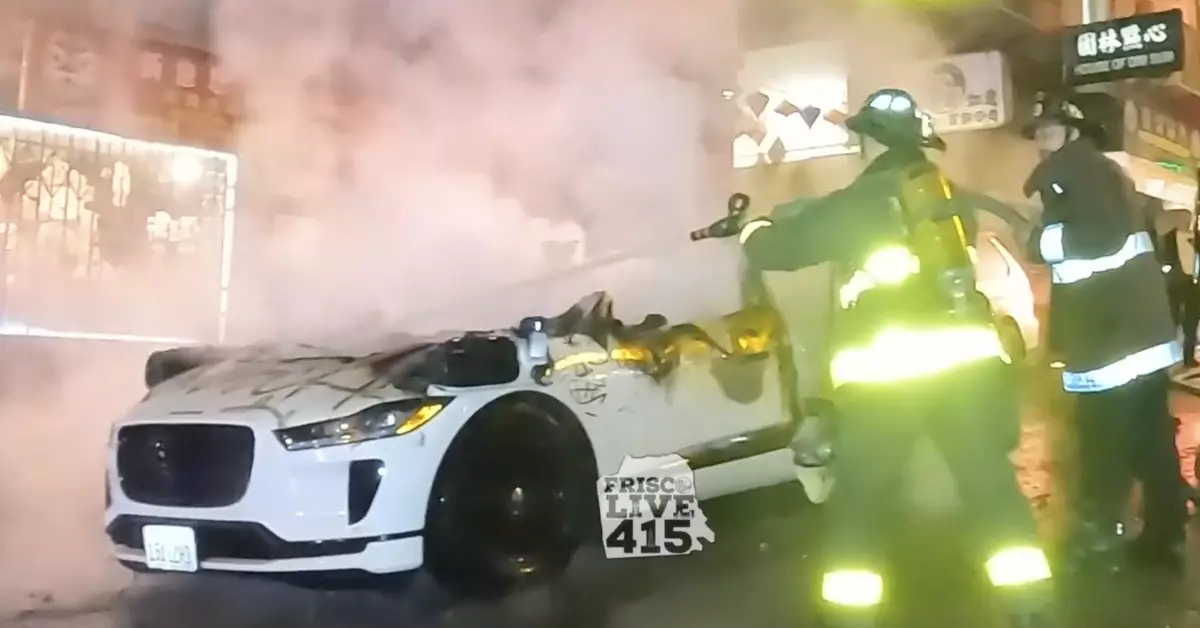In a shocking incident that unfolded in San Francisco’s Chinatown, a Waymo driverless taxi was attacked and set on fire by an unidentified individual. The incident took place around 9 PM PT, drawing a crowd that applauded the perpetrator’s actions. This unprecedented act of vandalism not only highlights the ongoing animosity between San Francisco residents and autonomous vehicle operators but also raises concerns about the safety and future of self-driving cars.
Details of the Attack
According to a report in The Autopian, the assailant jumped on the hood of the Waymo driverless taxi and smashed its windshield. The car was subsequently covered in spray paint, its windows were shattered, and eventually set ablaze. Despite the fire department arriving at the scene within minutes, the vehicle had already been completely engulfed in flames. Fortunately, there were no reported injuries as the car was not transporting any passengers at the time of the attack.
At present, no clear motive for the attack has been reported by any outlets. The incident has left numerous unanswered questions, leaving authorities and the public perplexed as to why such an act of destruction occurred. The lack of information regarding the motives behind this attack only adds to the concern and uncertainty about the security and acceptance of driverless vehicles.
Tensions Between Residents and Automated Vehicle Operators
This incident is not an isolated occurrence but rather indicative of the long-standing tension between San Francisco residents and autonomous vehicle operators. Last year, the California DMV suspended the operations of Waymo’s rival, Cruise, after one of its cars struck and dragged a pedestrian. Additionally, autonomous taxis have caused disruptions in the city, obstructing traffic or colliding with emergency vehicles. Even last week, a Waymo car struck a cyclist, raising further doubts about the safety of these vehicles.
City officials and residents have vehemently opposed granting 24/7 operation licenses to the driverless cars, often demonstrating their discontent by immobilizing the vehicles with orange cones. These acts of vandalism and resistance reflect the broader societal challenges faced by technology companies as they deploy autonomous equipment in public spaces.
Vandalism and defacement have been ingrained in the human experience throughout history. From subway cars in New York City to the ancient ruins of Pompeii, these acts of destruction illustrate the complex relationship between society and public spaces. With the emergence of new technologies like driverless cars, tech companies are now grappling with the inevitability of vandalism.
In cities worldwide, scooters are tossed into lakes, pedestrians resort to physically assaulting cars, and dockless bike share programs face mass destruction. These incidents not only pose immediate safety concerns but also raise profound ethical and philosophical questions about the coexistence of disruptive technologies in our society.
The recent attack on a Waymo driverless taxi in San Francisco serves as a stark reminder of the challenges and uncertainties surrounding autonomous vehicle deployment. As the investigation into this incident continues, it is imperative for authorities and technology companies to address the concerns of both residents and operators. Striking a delicate balance between progress and social acceptance will be crucial in navigating the future of self-driving cars and ensuring their safe integration into our cities.


Leave a Reply